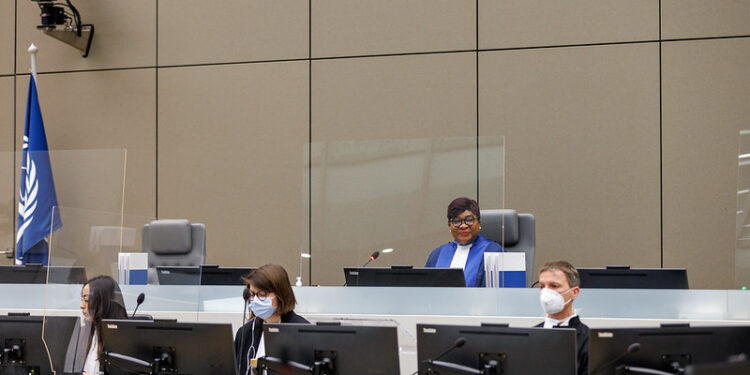Kenyan lawyer Paul Gicheru has opposed the prosecution’s application asking the International Criminal Court to allow it to formally submit eight items of evidence it says will assist the court to determine the truth and contribute to the expeditious conclusion of the trial.
The prosecution said it had consulted the defence on its intention to file the motion, which it said is “consistent with the rights of the accused in this case”, but Gicheru’s lawyers had opposed the move.
“The defence has not yet provided reasons for opposing the submission of the tendered evidence and thus the prosecution is unable to anticipate their arguments against the submission,” said the application signed by Deputy Prosecutor Nazhat Khan and dated April 5, 2022.
It is not clear if the court had invited Gicheru’s defence to respond in writing to the application.
The prosecution also asked Trial Chamber III’s Judge Miatta Maria Samba to vary the time limit she had set on the presentation of evidence to allow it to add five items to the list it intends to submit as evidence during the trial.
Khan explained that the prosecution could not have made its request earlier because the need only arose as a result of evidence elicited during the defence’s cross-examination of witness P-0730, an investigator from the Office of the Prosecutor (OTP) who gave an overview of the investigations in the Kenya situation at the time of the alleged offence.
During his cross-examination, the defence accused the witnesses who had provided evidence regarding attempts to corruptly influence them of being dishonest and unreliable. In response, P-0730 listed various sources of objective evidence on the strength of which he said he had concluded that the versions the witnesses had provided were truthful in their essential details. They include call data records (CDR) of a phone attributed to the accused.
“These items comprise call data records of phone numbers attributed to [Paul] Gicheru and [Silas] Simatwo respectively as well as an investigator’s report and annex by P-0730 providing relevant contextual information regarding the CDR,” Khan said.
At the insistence of the defence that the prosecution disclose the relevant call data and on the prosecution’s further inquiry of the witness, it emerged that P-0730 had recorded his recollections concerning the call data records in the form of an investigator’s report.
The prosecution wants the court to allow it to tender the report and the related call data records into evidence.
“The evidence tendered through this application consists of phone and call data records and comprises evidence gathered in the ordinary course of the investigation,” the deputy prosecutor said.
She further stated that the evidence contains material that is relevant for the attribution of phone numbers and probative of contacts between the managers of the witness interference scheme, including the accused, intermediaries, and associates.
On the lateness of its application, the prosecution said the defence will still have ample opportunity to submit evidence explaining Gicheru’s telephone contacts and/or rebutting P-0730’s interpretation.
Another item the prosecution wanted the court to admit is an investigator’s report of an interview of witness P-0028, which it said is relevant to the attribution of phone numbers. It explained that the court had earlier dismissed its attempt to admit the evidence as prior recorded testimony. It is now presenting the evidence in an alternative, legally accepted form.
The prosecution also asked the court to rule on outstanding items from its application filed on October 22, 2021 for the introduction of the prior recorded testimony of witness P-0397. The following month, the court partially granted the request but deferred the ruling on its admissibility. Although the trial judge rejected the defence’s opposition to the plea, she did not rule on the submission of the material.
Gicheru’s trial started on February 15, 2022, and went on until March 24, during which the prosecution presented its eight witnesses, who were all cross-examined by the defence. The defence lawyers have not yet presented an opening statement and have asked for time to examine the prosecution’s evidence and decide whether to mount a defence case.
Judge Samba gave Gicheru up to April 25 to state his stand on the way forward for his defence case and the number of trial days his team will need to conduct its suit if it decides to go that way.
On March 25, 2022, Gicheru’s lead defence counsel Michael Karnavas requested the court to order the prosecution to produce the video recording of witness P-0516’s proofing session, which was conducted on March 16, 2022.
He was not satisfied that after a long session, the prosecution had produced only three pages. He claimed that the session was not merely an attempt to familiarise the witness with his prior statements to give testimony, but to elicit new information and to “clarify” aspects that were not fully explained because the witness asked to stop the interview, or which would have contradicted the witness’s prior statements given to the OTP investigators.
According to him, the witness had told the prosecution lawyer, Anton Steynberg, to stop the interview six times but his legal adviser, Gregory Townsend, did not intervene to stop the questioning.
Unconvinced that P-0516 was answering questions truthfully, Steynberg continued for 14 pages, putting information to P-0516 for him to comment, despite a clear indication from the witness that he wished to stop the interview, said Karnavas.
“There is no legal or rational reason why the video recording should not be disclosed. The whole purpose of video-recording the proofing sessions is to ensure transparency,” he added.
P-0516 was the seventh prosecution witness. He admitted trying to implicate Gicheru in order to get favours from the ICC.
Gicheru, who is facing charges of witness tampering in the main case of Kenya’s Deputy President William Ruto and radio journalist Joshua Arap Sang, returned to Kenya on March 25, 2022, after the conclusion of the presentation of evidence by the prosecution.







